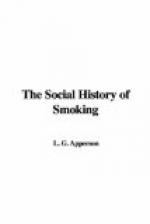Mr. A.D. Godley, in his “Oxford in the Eighteenth Century,” gives an excellent English version of the Latin original of one of the Christ Church “Carmina Quadragesmalia,” which affords much the same picture of the daily life of an Oxford Fellow in the days when George I was king. This good man lives strictly by rule, and each returning day—
Ne’er swerves a hairbreadth from the same old way. Always within the memory of men He’s risen at eight and gone to bed at ten: The same old cat his College room partakes, The same old scout his bed each morning makes: On mutton roast he daily dines in state (Whole flocks have perished to supply his plate), Takes just one turn to catch the westering sun, Then reads the paper, as he’s always done; Soon cracks in Common-room the same old jokes, Drinking three glasses ere three pipes he smokes:— And what he did while Charles our throne did fill ’Neath George’s heir you’ll find him doing still.
It seems to have been taken for granted that country parsons smoked. Smoking was universal among their male parishioners from the squire to the labourer (when he could afford it), so that it was only natural that the parson, with little to do, and in those days not too much inclination to do it, should be as fond of his pipe as the rest of the world around him. In a World of 1756 there is an account of a country gentleman entertaining one evening the vicar of the parish, and the host as a matter of course proceeds to order a bottle of wine with pipes and tobacco to be placed on the table. The vicar forthwith “filled his pipe, and drank very cordially to my friend,” his host. One cannot doubt that Laurence Sterne, that most remarkable of country parsons, smoked. His “My Uncle Toby” is among the immortals, and Toby without his pipe is unimaginable.
The most famous of country clergymen of the early Georgian period is, of course, Fielding’s lovable and immortal Parson Adams. Throughout “Joseph Andrews” the parson smokes at every opportunity. At his first appearance on the scene, in the inn kitchen, he calls for a pipe of tobacco before taking his place at the fireside. The next morning, when he fails to obtain a desired loan from the landlord, Adams, extremely dejected at his disappointment, immediately applies to his pipe, “his constant friend and comfort in his affliction,” and leans over the rails of the gallery overlooking the inn-yard, devoting himself to meditation, “assisted by the inspiring fumes of tobacco.” Later on, in the parlour of the country Justice of the Peace, who condemned his prisoners before he had taken the depositions of the witnesses against them, and who, by the way, also lit his pipe while his clerk performed this necessary duty, Adams, when his character has been cleared, sits down with the company and takes a cheerful glass and applies himself vigorously to smoking. A few hours later, when the parson, Fanny, and their guide




